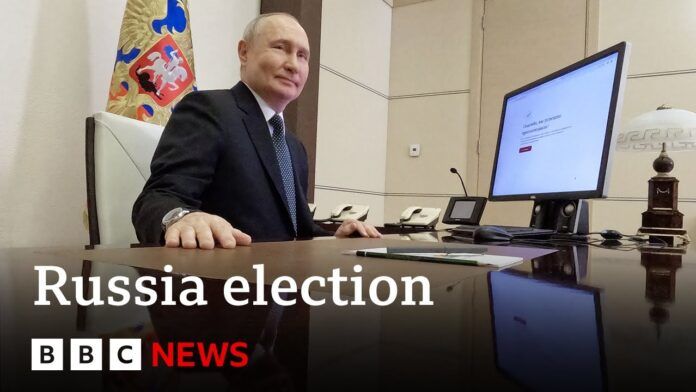Vladimir Putin wins a landslide victory in the Russian presidential election, claiming over 87% of the vote in a contest marked by the absence of real opposition
In an unprecedented show of political longevity and control, President Vladimir Putin has clinched a landslide victory in Russia’s latest presidential election, securing an overwhelming 87.8% of the vote according to exit polls from the Public Opinion Foundation (FOM). This victory not only cements Putin’s tight grip on Russian politics but also positions him as the nation’s longest-serving leader since the reign of Catherine the Great, should he complete this new six-year term. The election, shadowed by the ongoing conflict with Ukraine and characterized by a lack of serious competition, has prompted a chorus of international criticism, with many world leaders denouncing the vote as neither free nor fair due to the suppression of political dissent and the imprisonment of potential challengers.
The election unfolded under the long shadow of war, with Ukraine launching drone and rocket strikes against Russian territories, including attempts to penetrate Russian borders with proxy forces. Amid these tensions, Putin’s victory was not unexpected, given his control over the state and the electoral process, and his desire to demonstrate overwhelming domestic support for his leadership. This latest electoral triumph was achieved in the context of increased voter turnout, with reports of younger Russians participating more actively in the voting process, possibly signalling a complex mixture of support, resignation, and orchestrated political theatre within the country.
Reuters
Reuters reports detail the commanding victory of Vladimir Putin in the Russian presidential election, securing an unprecedented fifth term in office. With an exit poll indicating 87.8% of the vote, Putin’s win underscores his unassailable position in Russian politics, despite international criticisms regarding the electoral process’s fairness. His triumph sends a clear message to the West of Russia’s unified stance, particularly in the context of its military actions in Ukraine and its broader geopolitical ambitions.
Putin’s victory speech emphasized the consolidation of Russian society in the face of external pressures and threats, portraying his leadership as pivotal in navigating the challenges posed by the West. The election results, therefore, are presented not just as a personal win for Putin but as a collective endorsement of his foreign and domestic policies by the Russian populace.
BBC
The BBC coverage focuses on the transparency and legitimacy of Putin’s electoral victory, pointing out the orchestrated nature of the election. With no credible opposition allowed to contest, the election’s outcome was a foregone conclusion. The BBC report sheds light on symbolic protests inspired by supporters of the late Putin critic Alexei Navalny, indicating a simmering undercurrent of dissent within the Russian electorate. Western countries, including Germany and the UK, have criticized the election as a “pseudo-election,” highlighting the authoritarian underpinnings of Putin’s rule and the systemic suppression of political freedom and competition.
CNN
CNN offers an analytical perspective on Putin’s win, pondering the implications for Russia’s future direction, both domestically and on the international stage. The analysis suggests that the election solidifies Putin’s authority and may embolden his administration to pursue aggressive policies, particularly in Ukraine. However, it also raises questions about the potential for internal reforms, government reshuffles, and the long-term sustainability of Putin’s rule amid economic sanctions and demographic challenges.
The New York Times
The New York Times delves into the mechanics of the election, describing it as a heavily managed process that left no room for genuine competition. It highlights the strategic suppression of opposition voices and the portrayal of overwhelming public support for Putin’s continued leadership. The report discusses the implications of Putin’s victory for the war in Ukraine and his domestic policies, framing the election as a key moment in Putin’s efforts to cement his legacy and control over Russia.
DW
Deutsche Welle (DW) focuses on the international reactions to Putin’s election victory, noting widespread condemnation from Western governments and leaders who question the election’s legitimacy. DW’s coverage also touches on the potential consequences of Putin’s continued rule for Russia’s international relations, especially in the context of the Ukraine conflict and NATO’s stance. The report suggests that Putin’s victory, while expected, opens a new chapter in Russia’s global engagements, with uncertain implications for international stability and security.
